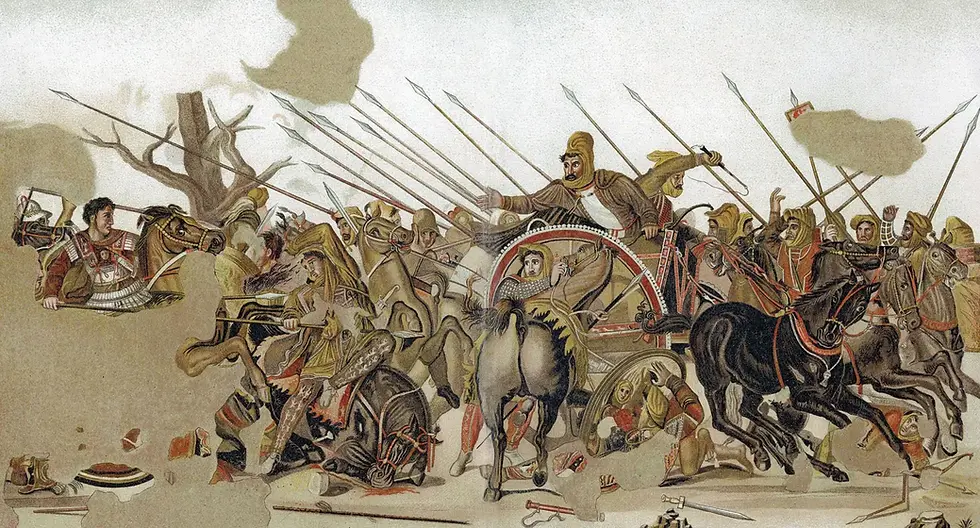Overview - Alexander the Great Campaign
- rayvia
- Feb 11, 2021
- 3 min read
Updated: May 10, 2024
In the annals of human history, no military commander has ever achieved victory without the steadfast support of a well-trained and disciplined army. Soldiers' loyalty to their leader is the linchpin of triumph or defeat on the battlefield. History is replete with accounts of legendary commanders and their formidable armies, such as Leonidas and his brave 300 Spartans at Thermopylae, or the strategic brilliance of Julius Caesar, Hannibal, and Napoleon, whose feats in battle are etched in grand tactical narratives. Nevertheless, these renowned leaders owe homage to the Macedonian and Persian rulers and their armies (Tanner, 2019).

Alexander the Great, born in 356 BCE in Pella, son of King Philip II of Macedon and Olympias, was raised amidst the belief in his divine lineage, taught by his mother to revere his heritage as a descendant of heroes and gods. King Philip II's military prowess and territorial expansion transformed Macedonia. At the tender age of 13, Alexander began his education under Aristotle, immersing himself in various subjects. By 16, with his father away on campaign, Alexander proved his mettle by defeating the formidable Sacred Band of Thebes, previously undefeated (Tanner, 2019).
Upon the assassination of his father in 336 BCE, Alexander ascended to the Macedonian throne at just 20, swiftly eliminating rivals to consolidate his rule and embarking on his awe-inspiring quest for world domination. His initial objective was to conquer Persia, a task he deemed not only his father's wish but also his destined path. He entrusted the regency to General Antipater and set forth to confront Persia. At the battles of the Aegean Sea, Sea of Marmara, and Granicus River, Alexander's Macedonian forces triumphed over Persian and Greek adversaries, leaving a trail of victory in their wake (Bosworth, 2013).

In 333 BCE, the Battle of Issus saw Alexander outmaneuver Darius III and his vast Persian host. Alexander employed strategic cavalry tactics to ensnare the numerically superior foe, prompting Darius III's retreat (Cartledge, 2015).
Rather than seeking Darius III's demise, Alexander sought to solidify his dominion over Persia, respecting the royal family even in defeat.
Alexander's strategic campaign continued after his triumphs, securing the eastern Mediterranean cities and Persian naval strongholds. Gaza fell to him in 332 BCE, opening the gates to Egypt, where he founded Alexandria, a testament to his prowess as a builder and administrator (Bosworth, 2013). From Alexandria, he ventured into Libya and consulted the oracle of Ammon, affirming his divine destiny.
The pinnacle of Alexander's conquests came at Gaugamela in 331 BCE, where he decisively defeated Darius III, paving the way for his ascension to the Persian throne. Alexander's governance differed markedly from his predecessors; influenced by Aristotle's teachings, he embraced a policy of cultural tolerance, preserving local traditions within his vast empire. This cultural impact, a testament to his enlightened rule, is still felt today (Cartledge, 2015).

Subsequent campaigns into Central Asia and India solidified Alexander's legacy, though personal tragedy and weariness eroded his once indomitable spirit. The death of his closest companion, Haphaestion, marked a turning point, leading to bouts of inconsistency and dissension within his ranks. Forced to return to Persia, Alexander's ambitions waned, and he passed away in Babylon in 323 BCE, having established a vast empire that reshaped cultural exchange and military technologies across the known world (Tanner, 2019).
In summation, Alexander the Great's military campaigns and diplomatic overtures left an indelible mark on history, forging alliances and propagating Greek culture across vast swathes of territory. His strategic insight and enduring legacy continue to captivate and inspire us today, a testament to his greatness.
References:
Bosworth, A. B. (2013). Conquest and empire: the reign of Alexander the Great. Cambridge University Press.
Cartledge, P. (2015). Alexander the Great: The hunt for a new past. Vintage Books.
Tanner, S. (2019). Afghanistan: a military history from Alexander the Great to the war against the Taliban. Da Capo Press.


Comments